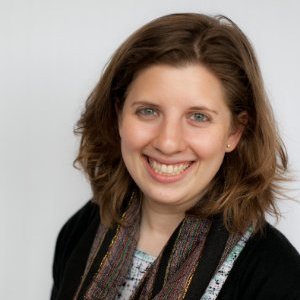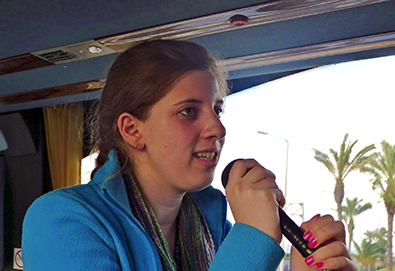Sara Miller
On the arts, education and her vision of a better world
 Sara Miller, MA/MBA’16
Sara Miller, MA/MBA’16
The arts, an educator's mindset and Jewish roots play largely into Sara Miller's outlook on life. She came to Brandeis University as an undergraduate student knowing she would find strong Jewish studies and music departments.
“I was set on majoring in NEJS (Near Eastern and Judaic Studies) when I began as a first-year student at Brandeis,” says Sara.
“Especially since I didn't go to day school, I didn't have a solid grounding in Jewish texts. I was that kid who enjoyed going to religious school and paid attention… What I sought upon entering college was a rigorous academic experience. Majoring in NEJS was for me an exercise in understanding more precisely and deeply about the kinds of things — Jewish things — I was passionate about.”
At Brandeis as an undergrad, Sara's extracurricular activities fell into two themes: the arts and Jewish life.
“I led the Hillel Orientation Committee and the Brandeis Reform Chavurah, and participated in Hillel Theater Group, University Chorus, Brandeis Swing Dancing Group and Hooked on Tap, among others — though not all at the same time!”
Sara's current musical instruments are piano and guitar. Every Sunday at Temple Beth Shalom in Needham she song-leads for groups of young people. “It's hard to believe that I've been song-leading for 10 years now,” she says. “Music is a great educational tool.”
 Sara Miller speaks to a group of participants for Taglit-Birthright Israel on the bus.
Sara Miller speaks to a group of participants for Taglit-Birthright Israel on the bus.
While Sundays will find Sara at Temple Beth Shalom songleading, the rest of the week she's working part-time as manager of special projects at Richard Levin & Associates — Richard is a Hornstein alumnus from 1976 — attending classes and completing assignments at Hornstein, and co-chairing the Hornstein Gender Initiative with classmate Rachel Eisen.
“The Hornstein Gender Initiative came to life for Rachel and me in part because we already knew we are very good at working collaboratively. We are both passionate about the issues surrounding gender equity and work-life balance. We hope that the Hornstein Gender Initiative will be a forum in which we can learn about gender issues in the Jewish professional world, the experience of Hornstein alumni and galvanize a conversation in the Hornstein community about our roles as Jewish professional leaders in helping to create a better world,” says Sara.
“I think some of this ‘better world' comes from making our organizations more conducive to professionals with families, being more consciously and intentionally welcoming and inclusive, and providing opportunities for pluralism to bloom and thrive.”
And she'd foster relationship-building with compassion in the driver's seat.
If she had to use just one word to describe her modus operandi, it would be empathy.
Expand All
I applied to a handful of colleges along the east coast within driving distance of my home in Northern Virginia. Brandeis was the only one I hadn't visited before applying! At the time, I was looking for schools that had strong departments in Jewish studies and in music. Ultimately, I chose Brandeis, which was a perfect fit in that regard!
As a NEJS student I walked by the offices of the Hornstein Program regularly. But I can remember my mother telling me about the Hornstein Program too after she'd clicked around on the Brandeis website.
For graduate school, I applied to some secular and some Jewish programs — all of which would have awarded an MBA plus another degree. I gave a lot of thought to whether I should return to Brandeis for graduate school, and ultimately I decided Hornstein was the right program for me — and I continue to believe that!
Early on I knew I wanted to focus on Jewish studies, and I believe I was set on majoring in NEJS when I began as a first-year. I was so hooked on NEJS that I ended up becoming the department's undergraduate department representative (UDR) in my junior year!
Especially since I didn't go to day school I didn't have a solid grounding in Jewish texts. I was that kid who liked going to religious school and paid attention… What I sought was a rigorous college-level academic experience that one gets at college. Majoring in NEJS was for me an exercise in understanding more precisely and deeply about the kinds of things — Jewish things — I was passionate about.
There are a number of experiences I've had that have brought me to this point in my career. Certain things feel more linear, so it may be easy to connect those dots. For example, my grandmother was involved with B'nai B'rith when I was young, so it made sense for me to join the B'nai B'rith Youth Organization (BBYO) in high school, which then compelled me to want to learn more about my Jewish identity.
I wholeheartedly credit and thank my parents for encouraging me to make career choices that dovetail with my interests and passions.
As an undergraduate, I was involved in a number of groups which mostly followed two themes: the arts and Jewish life. I led the Hillel Orientation Committee and the Brandeis Reform Chavurah, and participated in Hillel Theater Group, University Chorus, Brandeis Swing Dancing Group and Hooked on Tap, among others. (Not all at the same time, though!)
I attended a Jewish preschool which was cosponsored by two synagogues — one Reform, one Conservative — in Alexandria, Virginia where I grew up. It was (and remains) important to my parents that we participate in different aspects of Jewish life, whether it was attending family services once a month, attending Friday night services for yahrtzeits, going to religious school, lighting candles at home or celebrating holidays with my extended family.
I consider myself very lucky and have yet to experience extreme anti-Semitism on a college campus, but I've seen it in other places. For example, I was interning at the U.S. Holocaust Memorial Museum the summer before my junior year in 2009 when a man came into the building and shot the security guard.
It absolutely depends on the participant. I had many politically knowledgeable, aware and interested students but I also worked with many students who wanted to explore Israel in a cultural context absent from politics.
In my experience, I've witnessed Hillel and Chabad working together in collaborative and effective ways. But it really depends on each campus and each organization and the ways in which they work together.
I have a strong background in education. That is, I think like an educator. One of the things I took away from Ellen Smith's Proseminar class last year was the importance of certain skills that leaders need and use.
I believe that many of the skills one must acquire as an engager and an educator overlap extensively with skills of being an effective manager, focused leader and Jewish professional.
I think good Jewish leadership comes down to being a good person, being a mensch, and I mean that as a non-gendered term. Good leaders develop relationships. They approach their work thoughtfully and strategically. They are empathic and listen to others.
I also happen to be the daughter of a school counselor and have been influenced by that world and that language since the day I was born.
The arts are as intrinsic to my being as my Jewish identity. I play the piano and I play the guitar. I song-lead on Sunday mornings at Temple Beth Shalom in Needham. (My supervisor there is Rachel Happel, director of K-12 learning. She's a Hornstein alumna as well and we were excited to have her join a panel for the Hornstein Gender Initiative in November.)
My father's very musical so we've been singing since day one. Songs and singing play a role in how I learn, as well as just being a core part of my being.
At Brown RISD Hillel I would sometimes song-lead with students. While living in Providence I helped found the a cappella group Pastrami on RI for Jewish young professionals.
As hard to believe as it is, I have been song-leading now for ten years!
See Sara's online song-leading portfolio.
Rachel and I worked together for three years at Brown RISD Hillel, so when we started at Hornstein we already knew each other's styles and passions. We are very good at working collaboratively and we are both passionate about the issues surrounding gender equity and family work-life balance. We hope that the Hornstein Gender Initiative well be a forum in which we can learn about gender issues in the Jewish professional world, the experience of Hornstein alumni and galvanize a conversation in the Hornstein community about our roles as Jewish professional leaders in helping to create a better world.
So far we have organized four meetings, two of which were open to the whole community and one of which was open to women only because of the nature of our conversation and the safety we wanted to create for sharing. The third was a panel discussion for the entire Hornstein community about women in the Jewish workplace. The fourth was a conversation about leadership models in the workplace and the national stage. For the panel, we invited the executive director of Mayyim Hayyim, Carrie Bornstein; independent consultant, Margie Bogdanow; and director of K-12 at Temple Beth Shalom in Needham whom I mentioned earlier, Rachel Happel. Conversation centered on pay equality, workplace culture and career advancement.
The organization Advancing Women Professionals and the Jewish Community (AJW) recently released a list of 100 Jewish organizations that have adopted policies that are family-friendly. This list is part of their Better Work Better Life Campaign which works to improve parental leave and flexible work arrangements in Jewish organizations. Rachel and I are closely following their work and excited about what they are doing.
I've been lucky in that I've had some wonderful supervisors who've modeled concepts about healthy work environments and work-life balance and I've seen how that impacts not only the workplace but the greater Jewish community. Sure, I would like to continue working in those kind of places. But I have an open mind too about where I might work after Hornstein.
I'd like to stay in Boston for awhile. I have a diverse set of skills and interests so I'll be looking for opportunities in which I can contribute most effectively and meaningfully around issues I care about.
Empathy. Empathy is my MO.
This interview with Sara Miller was published in the Hornstein Program's Impact Newsletter, December 2015. If you would like to quote any part of this conversation, please attribute content to Sara Miller and the Hornstein Jewish Professional Leadership Program at Brandeis University and link to this page. All rights reserved.
 Sara Miller, MA/MBA’16
Sara Miller, MA/MBA’16 Sara Miller speaks to a group of participants for Taglit-Birthright Israel on the bus.
Sara Miller speaks to a group of participants for Taglit-Birthright Israel on the bus.